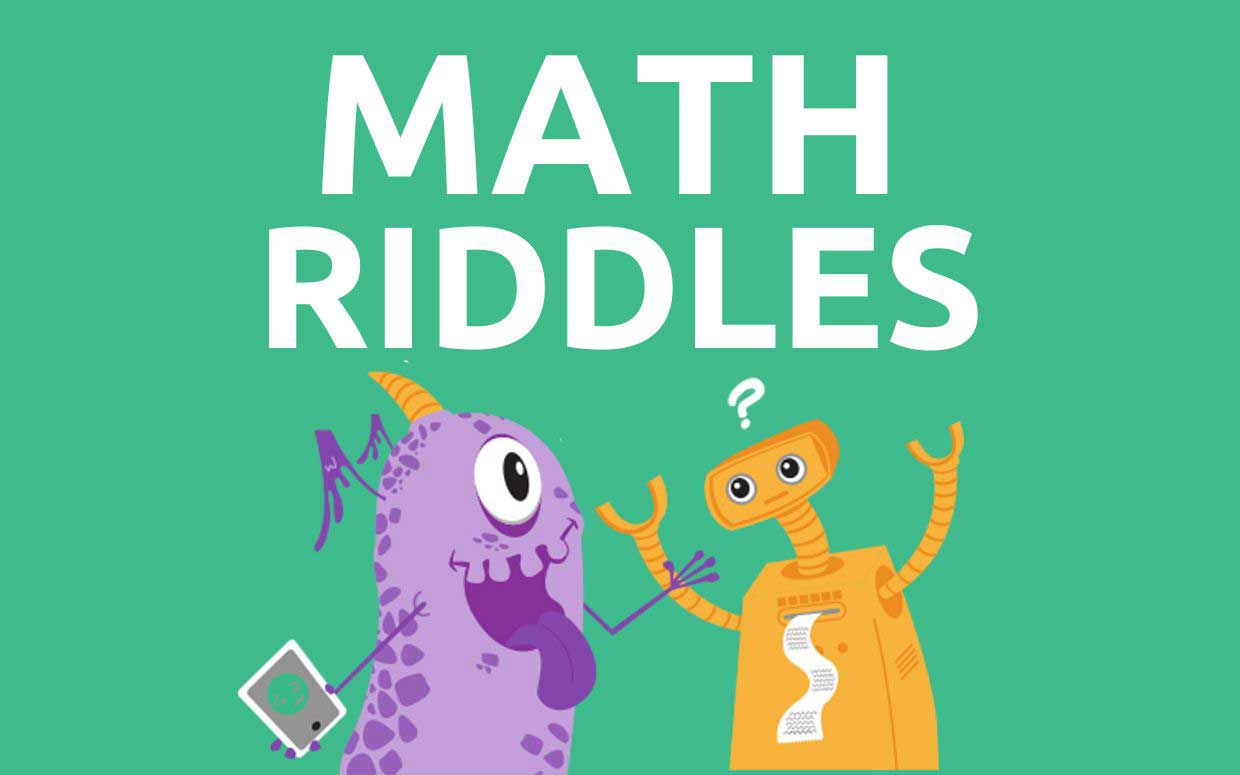
Riddle:
Walking home one day, you take a short cut along the train tracks. The tracks cross a narrow bridge over a deep gorge. At the point you are 3/8 of the way across the bridge, you hear the train whistle somewhere behind you. You charge across the bridge, and jump off the track as the train is about to run you down. As it happens, if you had gone the other way, you would have reached safety just before being run over as well. If you can run ten miles per hour, how fast is the train moving?
Answer: The train is moving at 40 miles per hour. Imagine that a friend is walking with you. When the train whistle blows, you head away from the train, he heads toward it. When he reaches safety, you will be 6/8 (or 3/4)of the way across the bridge, and the train will have just reached the bridge. For the train to cross 4/4 of the bridge in the time you cross the remaining 1/4, the train must be moving four times your speed.
Riddle:
Joe has ten coins totaling $1.19. From these coins, he cannot make exact change for a dollar, half-dollar, quarter, dime, or nickel.
What are the coins?
Answer: A half-dollar, a quarter, four dimes, and four pennies.
Riddle:
If 10 bags of jelly beans and 6 licorice sticks cost $1, and 10 licorice sticks and 6 jelly bean bags cost 92 cents.
How much does one licorice stick cost?
Answer: 5 cents while Jelly bean bags cost 7 cents.
Riddle:
Given two 2s, "plus" can be changed to "times" without changing the results: 2 + 2= 2 x 2.
The solution with three numbers is easy too: 1 + 2 + 3= 1 x 2 x 3.
What is the answer for 4 numbers and for 5 numbers?
Answer: Solution for 4 numbers:
1 + 1 + 2 + 4= 1 x 1 x 2 x 4.
Solution for 5 numbers:
1 + 1 + 1 + 2 + 5= 1 x 1 x 1 x 2 x 4
1 + 1 + 1 + 3 + 3= 1 x 1 x 1 x 2 x 4
1 + 1 +2 + 2 + 2= 1 x 1 x 2 x 2 x 2
Riddle:
A woman went into a bank to cash an insurance refund check. By mistake the teller gave her dollars for cents and cents for dollars. She put the money in her purse but accidentally dropped a nickel on the floor. When she got home, she found that she had exactly twice the amount of the check she had cashed. She didn't have any money in her wallet before going to the bank. What was the exact amount of that check?
Answer: The amount must have been $31.63. She received $63.31. After she dropped a nickel there would remain the sum of $63.26, which is twice the amount of the check.
Riddle:
A girl is twice as old as her brother and half as old as her father. In 50 years, her brother will be half as old as his father. How old is the daughter now?
Answer: 50 years old.
Riddle:
Twelve flags stand equidistant along the track at the stadium. The runners start at the first flag. A runner reaches the eighth flag 8 seconds after he starts. If he runs at an even speed, how many seconds does he need altogether to reach the twelfth flag?
Answer: Not 12 seconds. There are 7 segments from the first flag tot the eighth, and 11 from the first to the twelfth. He runs each segment in 8/7 seconds; therefore, 11 segments take 88/7= 12 4/7 seconds.
Riddle:
If a stopper and a bottle cost $2.10 and the bottle costs $2.00 more than the stopper.
Then what does the stopper cost?
Answer: Five Cents.
Riddle:
Lazy Larry agreed to work on a job for his brother-in-law for thirty hours at eight dollars an hour, on the condition that he would forfeit ten dollars per hour for every hour that he idled. At the end of the thirty hours Larry wasn't owed any money and didn't owe his brother-in-law any money either. How many hours did Larry work and how many hours did he idle?
Answer: Lazy Larry worked 16-2/3 hours and idled 13-1/3 hours. 16-2/3 hours, at $8.00 an hour amounts to the same amount as 13-1/3 hours at $10.00 per hour.
Riddle:
A hundred stones are placed, in a straight line, a yard distant from each other. How many yards must a person walk, who undertakes to pick them up, and place them in a basket stationed one yard from the first stone?
Answer: In solving this question it is clear that to pick up the first stone and put it into the basket, the person must walk two yards, one in going for the stone and another in returning with it; that for the second stone he must walk four yards, and so on increasing by two as far as the hundredth, when he must walk two hundred yards, so that the sum total will be the product of 202 multiplied by 50, or 10,100 yards. If any one does not see why we multiply 202 by 50 in getting the answer, we refer him to his arithmetic.
Riddle:
My only timepiece is a wall clock. One day I forgot to wind it and it stopped. I went to visit a friend whos watch is always correct, stayed awhile, and then went home. There I made a simple calculation and set the clock right.
How did I do this even though I had no watch on me to tell how long it took me to return from my friend's house?
Answer: Before I left, I wound the wall clock. When I returned, the change in time equaled how long it took to go to my friends house and return, plus the time I spent there. But I knew the latter because I looked at my friends watch when I arrived and left.
Subtracting the time of the visit from the time I was absent from my house, and dividing by 2, I obtained the time it took me to return home. I added this time to what my friend watch showed when I left, and set the sum on my wall clock.
Riddle:
An officer wishing to arrange his men in a solid square found by his first arrangement that he had 39 men left over. He then started increasing the number of men on a side by one, but found that 50 additional men would be needed to complete a new square.
How many men did the officer have?
Answer: The officer had 1975 men. When he formed a square measuring 44 by 44, he had 39 men over. When he tried to form a square 45 x 45, he was 50 men short.
Riddle:
A house has 6 stories, each the same height. How many times as long is the ascent to the sixth floor as the ascent to the third?
Answer: 2 1/2 times (5/2, not 6/3).
Riddle:
There are 4 borthers 3 of them want to buy a television which is 30 pounds. Each of them pay 10 pound each they give the money to the fourth brother and asked him to go into town and buy the television. When he got there the man said there was 5 pounds off so the fourth brother took the 5 pound and television and left. He decided to make some money out of this so he took 2 pounds and give the other 3 pounds to his brothers. So the 3 brothers only payed 9 pounds each. 3 times 9 is 27 were is the last pound?
Answer: Add 3 on to 25 = 28 then add 2
Riddle:
Mr. Grumper grumbles about bad time-keeping trains like everybody else. On one particular morning he was justified, though. The train left on time for the one hour journey and it arrived 5 minutes late. However, Mr. Grumper's watch showed it to be 3 minutes early, so he adjusted his watch by putting it forward 3 minutes. His watch kept time during the day, and on the return journey in the evening the train started on time, according to his watch, and arrived on time, according to the station clock. If the train traveled 25 percent faster on the return journey than it did on the morning journey, was the station clock fast or slow, and by how much?
Answer: The station clock is 3 minutes fast. The morning journey took 65 minutes, and the evening journey therefore took 52 minutes, and the train arrived 57 minutes after it should have left, that is, 3 minutes early.
Riddle:
A bird has a head 9cm long. The tail is equal to the size of the head plus a half of the size of the body. The body is the size of the head plus the tail.
How long is the bird?
Answer: 72cm. Th head is 9cm. The tail is 18 + 9= 27cm. The body is 9 + 18 + 9= 36cm. 9 + 27 + 36= 72cm.
Riddle:
A man had a bar of lead that weighed 40 lbs., and he divided it into four pieces in such a way as to allow him to weigh any number of pounds from one to forty. What are the weights of the four pieces?
Answer: 1, 3, 9, 27, are the weights of the four pieces.
Riddle:
This number added to it's square, and the digits of that summation added together, bring it back to itself. What is it?
Answer: 3. 3 squared is 9. 3+9=12. Take the two digits of the summation and add them; 1+2=3. In short; 3-9-12-3. This can also work with the number 0 and 9.
Riddle:
If 6 doubloons are worth 1 1/2 ducats, how many ducats are 27 doubloons worth?
Answer: 6 3/4 ducats (27/6=4 1/2. 4 1/2 x 1 1/2= 6 3/4)
Riddle:
How can you insert the numbers 1-9 inclusive each only, into the calculation to arrive at the answer 100?
( - ) + + - - - = 100
Answer: ( 7 - 5 )² + 96 + 8 - 4 - 3 - 1 = 100

